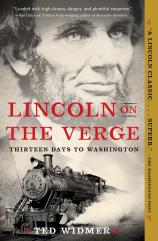Lincoln on the Verge: Thirteen Days to Washington
Review
Lincoln on the Verge: Thirteen Days to Washington
Riveting. Enthralling. Rewarding. Take your pick! Ted Widmer has written a history book that jumps from the page. It would be a mistake, though, to see LINCOLN ON THE VERGE solely as a history of the 13-day journey that Lincoln took from Springfield to Washington. It is certainly that, but it is also a sojourn that helped take America into a new age. Perhaps Lincoln’s “mystic chords of memory” best describe what Widmer has woven.
This arduous journey’s destination is only nominally Washington. Instinctively, Lincoln knows that it must be to America --- to its people --- as he travels from hamlet to town to city. All the while, Widmer elegantly lays out the dangers he faces. The rumors of assassination and a possible coup d’état abound in Washington. It is a southern camp that Lincoln has to face and conquer, but first he must arrive alive. Like Odysseus, the trip is fraught with danger and snares.
"Riveting. Enthralling. Rewarding. Take your pick! Ted Widmer has written a history book that jumps from the page."
When finished, Widmer constructs a vast “network” that Lincoln animates --- a journey that is touched by the lives of Lafayette, a dozen presidents, Walt Whitman, John Roebling, Elisha Otis, Winston Churchill, Allan Pinkerton, Rockefeller, Procter & Gamble, Charles Dickens, and many others. Without Lincoln, it is difficult to imagine Lafayette being remembered, and even more difficult to imagine Woodrow Wilson mattering. At the center of it all is Lincoln, breathing life into a dying ideal: government of the people.
In LINCOLN ON THE VERGE, the President-Elect wades into the fray armed with the Declaration of Independence, a devotion to the Union, and renewed in strength by the people’s faith in their country. The railroad, the telegraph, the Iliad and the Odyssey, the crowds --- these are the modes of locomotion that Widmer uses to propel us along with the 16th President. As the train hugs the shores of the mighty rivers along his trip, and the Lightning (Telegraph) fires non-stop around the U.S., we are along for a ride that takes us not only across the country, but across time. Lincoln, it becomes clear, is the catalyst for much of what is to come.
Like any good story, there are surprise heroes and villains here. Exposing the ineffectual James Buchanan and his deceitful cabinet is only the beginning. Washington, D.C. is revealed to be the personification of Slave Power. I’m not sure if this depiction is closer to Byzantium or the Death Star; either way, you are left rooting for its conquest and conversion. Each strand of the story is fascinating, but among my favorites is the parallel journeys of Lincoln and Jefferson Davis to their respective capitals. They could not have been more different, being played out against the ticking clock of secession.
On the hero side, we are treated to a great cast of unsung patriots --- from the local “clodhoppers” whose cheers strengthen Lincoln, to the unknown agents along the train route blinking their “all clear” signal. We get to meet Kate Warne and Dorothea Dix, as well as men like Pinkerton and General Winfield Scott. Of course, it’s Lincoln who is the greatest hero, as he bears the responsibility of leadership while fearing for his life. All of this is occurring against the backdrop of a Union that is bleeding states each day he travels.
Sprinkled throughout the book are marvelous Lincoln quotes and anecdotes hinting at the genius of the man that was so difficult to report in a newspaper, but so readily recognized by anyone in his presence. When speaking about Kentucky --- a state where he had garnered less than 1% of the vote --- he said, “I hope to have God on my side, but I must have Kentucky.”
Smaller historical subplots play out with astonishing consequences. New York City is revealed as “virtually an annex of the South.” Vice President John Breckinridge, who would later serve as a Confederate general and the Confederate States of America’s Secretary of War, was in possession of the yet uncounted presidential ballots. Then there are the details surrounding the Knights of the Golden Circle and their plans for the Confederacy. Each of these stories, and others, that threatened the Union and its President-Elect make LINCOLN ON THE VERGE a strong recommendation.
Reviewed by John Vena on April 24, 2020
Lincoln on the Verge: Thirteen Days to Washington
- Publication Date: December 29, 2020
- Genres: History, Nonfiction
- Paperback: 624 pages
- Publisher: Simon & Schuster
- ISBN-10: 1476739447
- ISBN-13: 9781476739441



